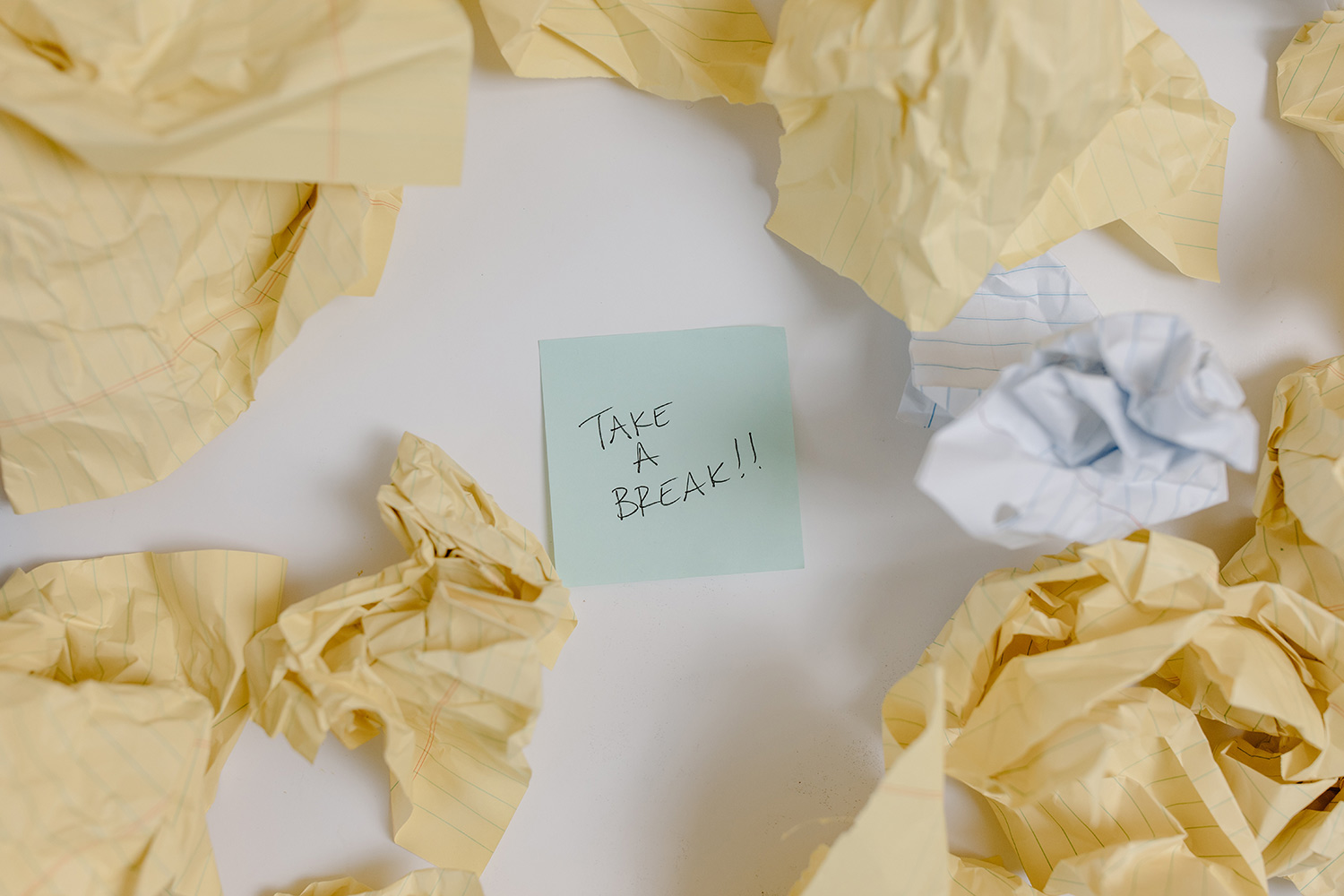Why It’s Important To Take Time Off From Work (+ Template To Ask For It)
Learn how to take time off from work to recharge and avoid burnout without feeling guilty. Use our request time off email template to make this easier now:

How do you take time off from work without feeling guilty about it?
For many remote workers, the answer is simple: you just keep working.
But doing this forever means you may be so overworked that you’re actually considering quitting your job without a plan (don’t do it!).
So before you get to that point, let’s talk about how to take time off from work and disconnect for real.
That means no checking Slack messages or working from the beach. We’re talking about having a few consecutive days away from the grind (ideally, one to two weeks!) to do whatever you want, wherever you want to be.
As you’ll learn in today’s guide, remote workers are less likely to take time off and more likely to report mental health issues like stress, anxiety, and the telltale signs of burnout.
But that doesn’t mean you can’t flip the script.
We’ll show you why it’s in your best interest to take time off from work and share a request time off email template to make this happen sooner than later.
So Why Are Remote Workers Less Likely To Take Time Off From Work?
You can blame digital nomads for normalizing “working vacations.” This early group of remote work adopters made it chic to squeeze in a few hours of work from the beach or their van parked in a lush jungle.
But taking time off from work isn’t just about a change in scenery. It’s about completely disconnecting and disengaging from your professional priorities.
During COVID’s grasp on 2020, many remote employees let their vacation time pile up rather than deal with social distancing and travel restrictions.
But this led to some alarming outcomes, as statistics show:
- The average workday increased by 48.5 minutes following stay-at-home orders.
- Remote employees clocked an extra 26 work hours each month (on average) -- that’s almost an extra day every week!
- Many replaced their commute time with more work rather than use the time for healthy activities, hobbies, or relaxation.
- Companies offering unlimited vacation noticed that nearly half of all remote workers used just two or three weeks per year. Another 10% only took one week off, 5% took less than that, and another 5% didn’t take any vacation time at all!

So what’s going on here? Why can’t employees leave work behind and take the vacations they deserve?
Guilt: The Most Common Reason People Skip Taking Time Off
In one survey, more than half of American employees (54.2%) admitted to feeling guilty about using their vacation time. So a staggering 70.4% said they check in with work regularly while they’re away.
Hey, we totally get it. The Great Resignation means more employees are picking up the slack of coworkers who quit without warning.
Taking time off when your team is already swamped with extra duties may seem like you’re adding yet another burden to the stack. But if you schedule your time off with enough advance notice, you may be able to minimize this stress for everyone and still get the time off you need.
The Best Reasons to Take Time Off From Work
Employees working in the European Union are entitled to a minimum of 20 days off per year. Many countries even guarantee up to 30 days off annually.
But the US has no federal minimum amount of days off employers must give their workforce. The best most employers offer is an average of 11 paid days off each year.
Here’s why you should use every last one of those days:
Health Benefits Galore
Studies have confirmed that stepping away from the workplace delivers major health benefits, such as:
Less stress. Removing yourself from work stress gives your body a chance to process anxious feelings and boost coping. Researchers in one study noticed employees who took vacations reported fewer stress-related physical symptoms, including headaches, backaches, and heart irregularities up to five weeks later.
A healthier ticker. Skipping vacations may actually increase your risk for heart disease. As scientists learned:
- Men at risk for heart disease who skipped vacations for five consecutive years were 30% more likely to suffer heart attacks than those who took at least one week off annually.
- Women who took a vacation once every six years were almost 8x more likely to develop heart disease, have a heart attack, or die of a coronary-related cause than those who took at least two vacations per year.

Better sleep. We all know that clocking more snooze time is essential for your health, higher brain power, and better moods. But when you’re stressed and anxious about work, it’s almost impossible to capture those restful ZZZs. Taking a vacation can help interrupt poor sleep habits (like staying up late to work), so you can hit the pillow sooner and stay asleep longer.
Resist Burnout, Boost Good Vibes and Productivity
Working remotely blurs the boundaries between work and home life. Without a commute, formal office setting, or coworkers to cue your time off, many remote employees lack a clear separation between being “on” and disengaging.
In fact, many remote workers say the biggest challenge of working remotely is unplugging for the day. There’s no hard reset between one work day and the next.
But your brain needs this time to shut down.
Work-from-home burnout is real, and happens when you constantly feel stressed, exhausted, and apathetic about your work performance.
You may start to dread clocking in for work each day or not want to put in the elbow grease required to complete tasks on your plate. It may be easier for distractions to steer you off course. And you may be second-guessing whether remote work is really right for you.
These are all signs you’ve hit burnout and need a reset! Your work life is officially too physically, mentally, and emotionally draining for you to perform at the level you’re capable of.
So does this mean you have to return to corporate office life? Nope! You just need a psychological break from work and time off to recharge your batteries.
This time away will help you recover from all the hard work you’ve been putting in and make you a better employee when you return. According to one study of employees who took a vacation:
- 68% reported more positive moods
- 57% were less stressed
- 66% had higher energy levels
- 57% raised their motivation to work
- 58% were more productive
- 55% said the quality of their work improved

In another study, every 10 hours of vacation time an employee took improved their year-end performance ratings by 8%. Another showed that high-level professionals required to take time off were significantly more productive than those who spent more time working.
Science says you’re actually more productive when you take breaks. So just imagine what a whole week off (or more!) could do for your work life.
Refill Your Creative Tank
English social psychologist Graham Wallas proposed a theory about the four stages of creative thinking, which includes:
- Preparation, or assessing a problem.
- Incubation, in which someone disengages from the creative process to let their unconscious mull over the challenge.
- Illumination, or the Eureka! moment of discovering an idea or solution.
- Verification: successfully applying the idea.
Wallas was confident that rest and time away from the problem was the only way to activate the critical incubation and illumination stages of creativity.
So if you’re finding it more difficult to come up with creative solutions for work problems, or you’re fresh out of inspiration in a creative field like design, taking time off may be the best solution.
A vacation allows you to be inspired by new locales, people, and conversations. You’ll get to refill your creativity bank after consistently draining it at work.
So now that you know all the reasons to take time off from work, let’s make it happen!
6-Step Game Plan To Take Time Off From Work
Follow these steps to take time off from work without feeling guilty or burdening your coworkers at the last minute:
1. Choose a Reset that Works Best for You
You’re entitled to take time off from work, and we’re encouraging you to use all your earned hours to disconnect.
So think about what would make you happiest and get your mind off the work tasks you’re momentarily putting aside.

Would a yoga retreat in an exotic locale help reset your body’s happy meter? What about a history or art tour in a famous ancient city? Need the peace and solitude camping with your spouse or bestie (and fave four-legged friend) can provide?
You’re the only one who knows what will help your body recharge and inspire a new, brighter outlook on life. Figure this out, and you’ll have even more motivation to follow through on your time off request.
2. Research Your Company’s Time Off Policies
Many companies organize time off into three separate categories: personal time, vacation time, and sick time. Other companies lump all these into a single bucket of paid time off that you can use as you wish.
So before putting in a time off request, make sure you understand:
- How much time off you’re entitled to or have accrued
- How many days off you can take consecutively
- Which days you cannot request off (such as all-hands meeting days)
- How much notice you need to give in advance to take time off
Falling in line with your company policy makes your request much more likely to get approved.
3. Check the Company’s Shared Calendar
To further boost your chances of having your time off approved, make sure to request days that don’t overlap with big project deadlines or other employees’ time off requests.
For example, most accountants aren’t allowed to take a vacation in early April, as this is high tax season and all employees are needed.
The hardest part about syncing your calendar is trying to get multiple consecutive days off without schedule conflicts. One week is a good start; two weeks off is magic.
You’ll need time to shift gears and adjust to vacation mode, especially if you’ve been on the hard grind for months. If you only take a few days off, you’ll be right back at work as soon as you settle in to chill.

Try not to ask for time off when:
- It’s your company’s busiest season
- Your team’s in the middle of a crisis
- Multiple coworkers also requested the same days off
- You have a big project to finish during your requested time off
The best time to ask for time off is after you’ve wrapped a big project or delivered work to a client and received heaps of praise. Your boss will be happy to approve your request and consider your vacation well-earned.
4. Request Your Time Off As Far In Advance as Possible
Once you have a few dates in mind, you’ll want to communicate with your supervisors as early as possible. This gives your team time to prepare for your absence without dropping the ball (and upsetting clients).
We suggest requesting time off via email, so you can explain your reasons or situation and document your specific dates in writing. You’ll find a time off request email template to use at the end of this guide.
You can also request a Zoom or Skype meeting to discuss your time off request over video call. Use this time to discuss your plans for coverage and how your work will be handled while you’re away (more on this next).
There are two common routes to sharing your reasons for taking time off:
- Make it personal. You could say you need time off for a family reunion, wedding, graduation, or vacation with your significant other.
- Keep it professional. Remind your boss that you’re requesting time off during the slowest time of the year, when other coworkers will be present, or as soon as you wrap a big project (and before starting another one).
Resist the urge to make plans until you receive a definitive approval in writing.
5. Develop a Plan for How Your Work Will Be Handled
Give your boss confidence that tasks won’t fall through the cracks while you’re away, and you’ll be more likely to see that time off approval.
So speak with your coworkers about who will handle tasks you’re typically responsible for. Complete all your outstanding work and see if you can tackle some of the most important tasks on the horizon in advance. This ensures you don’t leave anyone hanging or overburdened when you’re gone.
Keep in constant communication with your team in the days leading up to your time off. Tie up any loose ends. And don’t forget to remind your coworkers and clients that you’ll be out of touch the following week(s). You don’t need any unhappy surprises.
6. Truly Disconnect -- No Cheating!
If you tell coworkers, leaders, and clients that you’ll be on vacation disconnecting, you better not show up in their